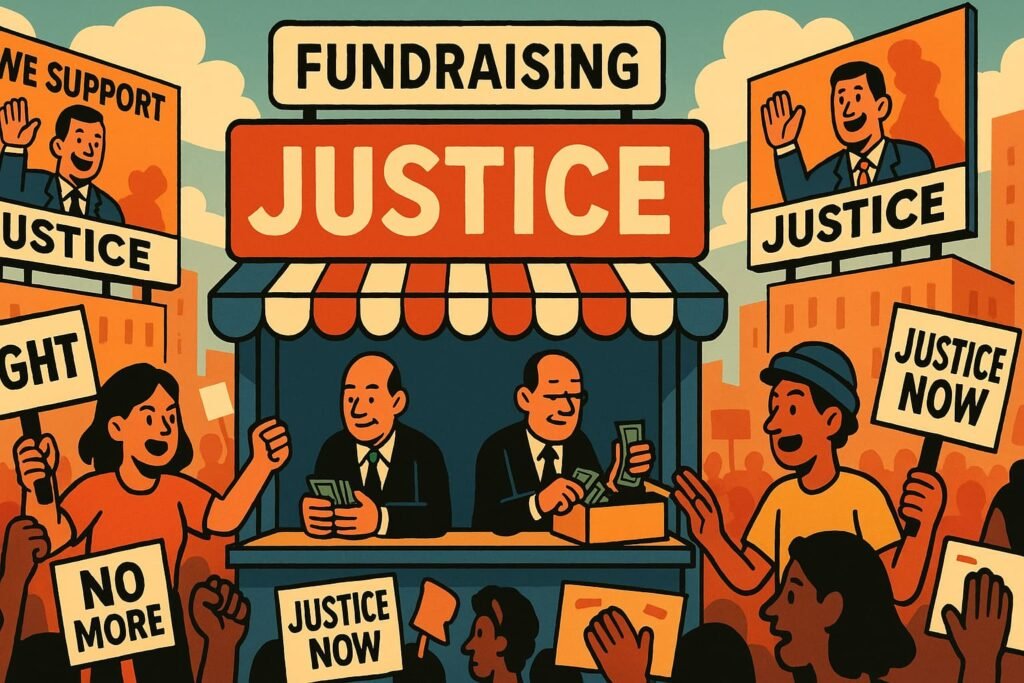NGOs & Activism – The Business of Selling Justice
Justice for Sale
NGOs once meant charities and volunteers collecting donations to save whales or fight poverty. Today, they are political powerhouses — selling justice as a brand, shaping laws, and cashing in on outrage.
The formula is simple: add the word justice, and any cause becomes a moral crusade. Climate turns into climate justice. Migration becomes refugee justice. These words don’t just inspire — they open wallets, attract headlines, and silence criticism.
What began as grassroots activism has grown into a permanent industry. NGOs don’t just campaign anymore; they run conferences, hire executives, and operate like corporations. Their product isn’t solutions — it’s outrage packaged as justice.
Table of contents
The Playbook of NGOs and Activism
NGOs thrive by framing every issue as injustice. The pattern is always the same:
- Frame the Problem Morally: Pollution becomes climate injustice. Borders become exclusion.
- Paint a Villain: Rich countries, corporations, or anyone resisting the narrative.
- Mobilise Outrage: Protests, hashtags, and media campaigns build pressure.
- Cash In: Fundraising, government grants, and corporate partnerships follow.
The outcome? Causes that sound less like charity and more like business models designed never to end.
Buzzwords that Unlock Donations
NGOs and activists rely on a dictionary of buzzwords that double as fundraising codes:
- “Equity” – Signals imbalance, demanding money to “level the field.”
- “Empowerment” – Code for programs that never end, keeping funding alive.
- “Voiceless” – Conveniently allows NGOs to speak (and profit) on someone else’s behalf.
- “Solidarity” – A moral tax: donate, protest, or at least feel guilty.
These words act like cheat codes, guaranteeing sympathy, headlines, and money.
Why Governments and Corporations Love NGOs
NGOs don’t just survive on donations. They thrive because elites find them useful.
- Governments outsource awkward moral work to NGOs, then cite them as “civil society” approval.
- Corporations partner with NGOs to polish their image, gaining “justice credibility” without touching wages or taxes.
- Media treat NGO press releases as neutral truth, ignoring that many operate as lobbying machines.
Everyone wins — except the public, who foot the bill through taxes, higher prices, or endless campaigns.
The Cynical Side of NGO Power
Behind the moral branding lies a business model built for permanence:
- Permanent Emergencies: Problems can’t be solved, or the funding stops.
- Elite Lifestyle Activism: Executives enjoy six-figure salaries and luxury conferences.
- Selective Outrage: High-profile causes attract donations; quieter crises get ignored.
- Accountability Gap: NGOs answer to donors, not voters.
NGOs don’t operate like democracies. They operate like corporations with moral slogans.
Why It Matters
When NGOs and activists brand everything as justice, they shift politics itself. Laws, policies, and even wars can be justified by NGO campaigns. Yet the public never voted for these organisations. Their power comes from moral authority, not democratic legitimacy.
The irony? NGOs claim to amplify the powerless — but often end up speaking over them, turning justice into a commodity.
Activism as an Industry
Activism no longer means marches and petitions. It means professional NGOs with branding strategies, PR teams, and government influence. Their product is outrage, their brand is justice, and their business is permanence.
Justice has become a commodity — marketed, packaged, and sold. And like any industry, the goal isn’t fairness. It’s influence, control, and cash.
FAQ: NGOs and Activism
What does NGO mean?
It stands for “non-governmental organisation,” usually a charity or non-profit claiming independence from governments.
How do NGOs use justice language?
By framing causes as moral struggles — climate justice, social justice, refugee justice — to win influence and funding.
Why are NGOs powerful?
Because they shape public opinion, attract donations, and pressure governments without democratic accountability.
Are NGOs always positive?
Not necessarily. Many do good work, but others operate like corporations with salaries, branding, and lobbying goals.
What’s the danger of NGO activism?
It turns justice into a permanent business, keeping crises alive while solutions take a back seat.



